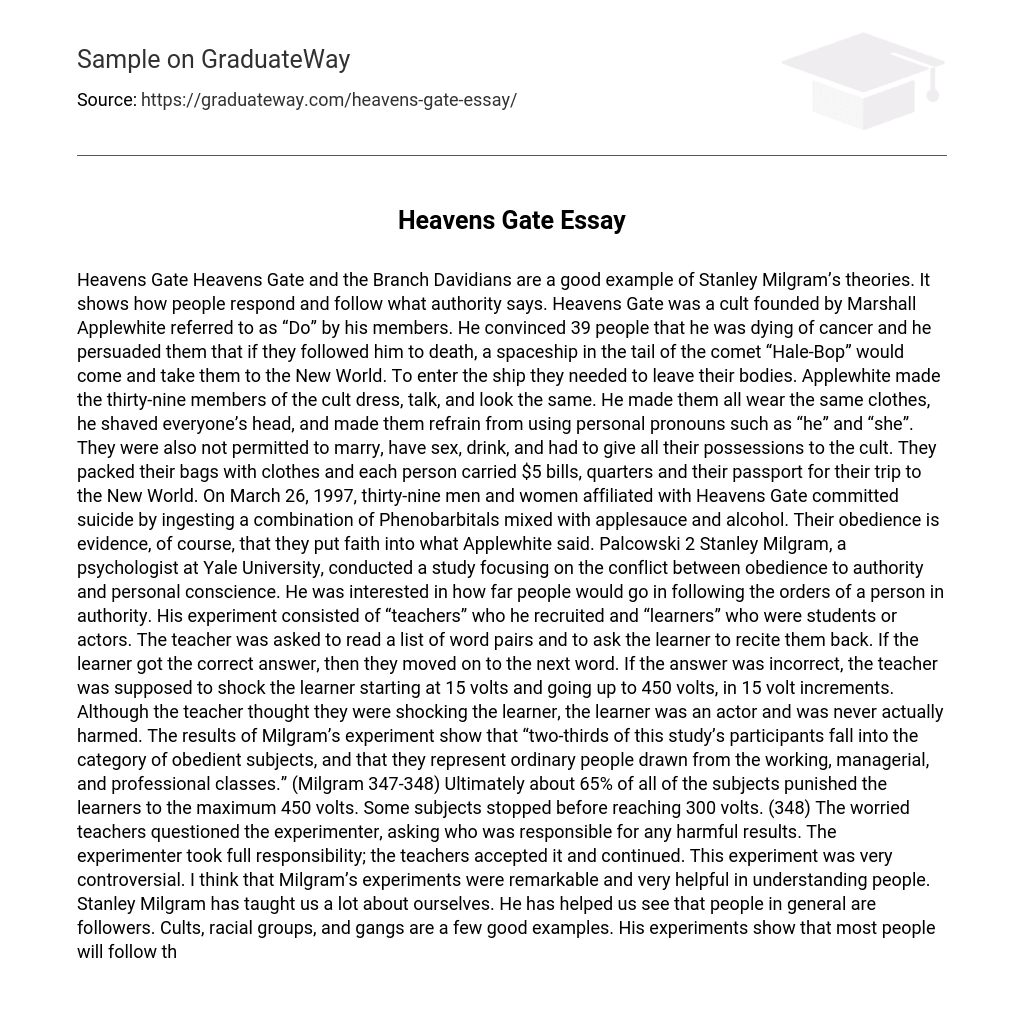The cases of Heavens Gate and the Branch Davidians exemplify Stanley Milgram’s theories on individuals’ responses to authority. Marshall Applewhite, also known as “Do,” established Heavens Gate and convinced 39 people that he had terminal cancer. He persuaded them that by dying with him, a spaceship in the comet “Hale-Bop’s” tail would transport them to a new world. To gain access to the ship, they had to abandon their physical bodies. Applewhite enforced uniformity within the cult by requiring identical dress, speech, and appearance among members. They wore matching clothes, shaved their heads, and were prohibited from using gender-specific pronouns. Additionally, they were forbidden from marrying, engaging in sexual activities or consuming alcohol and had to give up all possessions to the cult. In preparation for their journey, they packed belongings along with $5 bills, quarters, and passports. On March 26th in 1997, all 39 individuals associated with Heavens Gate committed suicide by ingesting a lethal mixture of Phenobarbitals blended with applesauce and alcohol. Their unwavering obedience provides strong evidence of their complete trust in Applewhite’s teachings.Yale University psychologist Stanley Milgram conducted an experiment investigating obedience to authority versus personal morals.His purpose was to determine how willing individuals would be to follow orders from authoritative figuresThe study comprised two groups: the “teachers” and the “learners.” Milgram enlisted the teachers and instructed them to go through a list of word pairs, asking the learners to repeat them. If the learner provided a correct answer, they would proceed to the next word; if incorrect, the teacher would administer an electric shock, starting at 15 volts and increasing by 15-volt increments up to a maximum of 450 volts. Importantly, it should be noted that these shocks did not actually harm the learners who were played by actors or students. Milgram’s findings demonstrated that approximately two-thirds of participants could be categorized as obedient subjects and represented ordinary individuals from diverse professions (Milgram 347-348). Overall, around 65% of all subjects administered a punishment of 450 volts to the learners, while some stopped before reaching 300 volts (348). The teachers expressed concerns about potential harm inflicted on the learners and questioned accountability. Nonetheless, without hesitation, the experimenter fully accepted responsibility for any negative outcomes encountered. This experiment sparked considerable controversy. In my personal view, I find Milgram’s experiments remarkable and valuable in terms of our understanding of human nature. Through his research, Milgram illustrated people’s inclination to follow others as observed in various groups like cults, racial groups, and gangs.These experiments effectively highlight that the majority of individuals tend to conform and follow instructions from figures of authority. While some criticize Palcowski’s experiments for being unethical and insignificant, I initially shared this viewpoint until I realized that his findings actually contribute to our understanding of group dynamics and cognition. Milgram’s experiments revealed that people are inclined to obey authorities they trust. Consequently, those who strongly believe in a persuasive leader often face a tragic fate imposed upon them by said leader. The case of Heaven’s Gate exemplifies how this destiny led to death, underscoring followers’ extreme willingness to sacrifice their own lives in pursuit of absolute obedience to their leader.
Stanley Milgram’s Theories on Authority and Obedience
The Heavens Gate cult, founded by Marshall Applewhite, is an example of Stanley Milgram’s theories on obedience to authority. Applewhite convinced 39 people to commit suicide in order to enter a spaceship in the tail of the comet Hale-Bop” and be taken to the New World. They were made to dress, talk, and look the same, and refrain from personal pronouns, marriage, sex, and alcohol. They packed their bags with clothes and each carried $5 bills, quarters, and passports for the trip. Milgram, a psychologist at Yale University, conducted a study on obedience to authority, where teachers were asked to shock learners for incorrect answers. Results showed that 65% of participants punished the learners to the maximum 450 volts. Milgram’s experiments show that people will follow a leader if they believe in them, as seen in cults, racial groups, and gangs. Although controversial, Milgram’s experiments helped us understand more about groups and how they think.”
Cite this page
Stanley Milgram’s Theories on Authority and Obedience. (2018, Sep 12). Retrieved from
https://graduateway.com/heavens-gate-essay/





